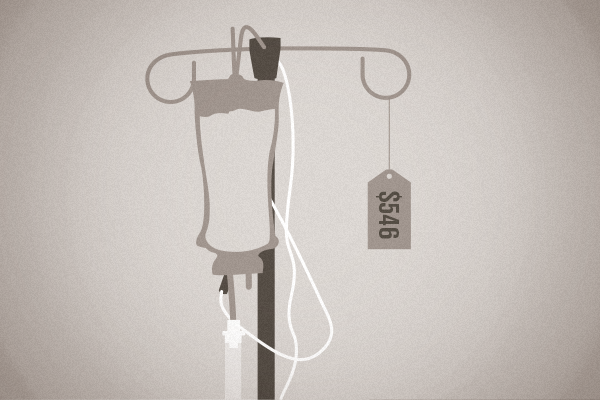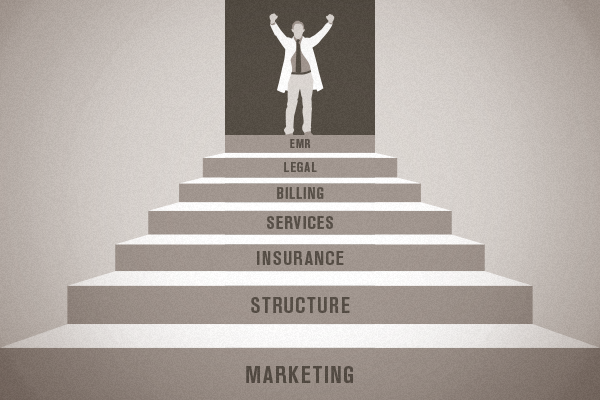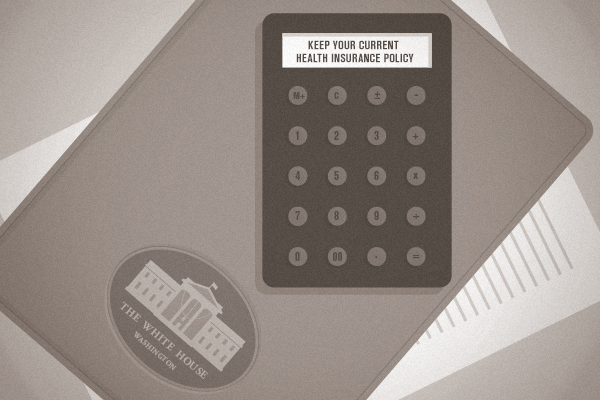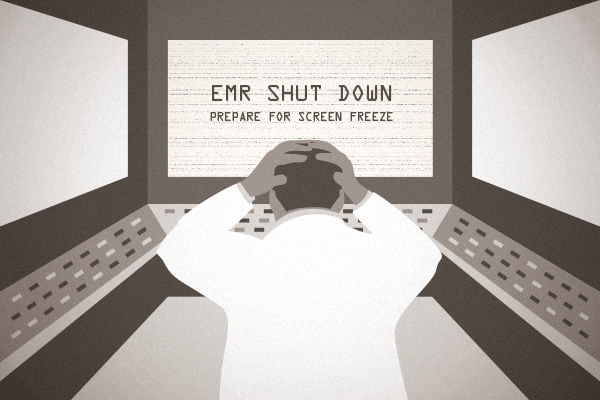If you read anything about EMRs today, make it this post from Val Jones, founder and CEO of Better Health. She depicts an EMR world that you can imagine like this: “Spend your days as a copy editor for an Indian transcription service, try to prevent patients from being labeled as syphilitics while worrying about whether or not the medicine they’re taking is classified as a tablet or a capsule in a system where you may not be able to enter any orders at all if the central tech command is fixing software instability in the Star Trek room.” Does this sound a bit absurd? Well then maybe you should read Jones’ entire post and let her explain how a technology that promised so much, wound up making things so much worse.
Tag Archives: Direct Care
The Atlas.md Revolution Has Begun
Thanks to Emily Behlmann of the Wichita Business Journal. She reported on an exciting development — two doctors in Pennsylvania have started operating their direct care practice with the help of Atlas.md. As promised, our web-based EMR Atlas.md is available for FREE during the current beta trial. We’re still looking for “cash-only” physicians interested in trying out the software and offering constructive feedback.
READ THE COMPLETE ARTICLE ON THE WBJ
Send us an email if you’re interested in previewing the first EMR/Practice Management software designed for insurance-free medicine. As radical as it sounds now, our movement only becomes commonplace as more doctors participate. Let’s do this together.
Dr. Rob Lamberts Knows What Direct Care Docs Need In Their EMR
One primary care physician has spelled out EXACTLY what he’s looking for in an EMR. He made a comparison between what current EMRs offer versus what he actually needs in his practice. We’re excited to hear his frustrations, because it proves once more what we’ve been saying for months–Atlas MD is the FIRST EMR built specifically for direct primary care physicians. And there’s nothing on the market like it.
READ THE COMPLETE BLOG POST HERE
Atlas MD is an EMR made to tell your patients story, so that you can find what you need, when you need it. It’s focused on work-flow, not billing codes (although they are included for reference if need be). It functions on ANY device you’d use in the office, not a clunky machine you paid thousands of bucks for. Atlas MD is like the innovative apps you see across other industries; it lets the user curate the experience so that what’s useful is immediately accessible.
The benefits of Atlas MD go on and on. And we’re looking forward to hearing what direct primary care docs have to say. Which, speaking of, raises an important question — do YOU want a sneak peak into our new EMR software? Would you be interested in writing about it? If so, send us an email. We can make that happen.

LISTEN: Atlas MD Podcast, Ep. 7
Tune in to the next installment of our podcast. Our direct care ship is sailing smoothly, patients coming in and out, some patients even tweeting about the great care they received.
My experiences with @atlasmd are always the epitome of person-centered medicine. What a blessing to have them in our city!
— Bailey (@BaileyBlair) September 6, 2013
We appreciate the kind words! Looks like there’s more publicity for Atlas MD, too – the direct care duo, Drs. Josh and Doug, will be speaking at the American Academy of Family Practice Docs on September 26th; the next day they will head to Colorado to speak to the Association of American Physicians and Surgeons.
LISTEN TO EPISODE 7 OF THE ATLAS MD PODCAST HERE
Oh, and some huge news — Atlas.md EMR has launched its beta trial! Please email hello[at]atlas.md if you want to be among the first users. It’s free for the first 90 days. Click through to review some highlights from the taping.

What Does A Rap Mogul Have To Do With Direct Care? Marketing (of course).
Manage My Practice put together a great case study about marketing your practice. They create a model of marketing success using the career of Jay-Z. Never heard of him? Well then your kids have. He’s only the most successful rap artist of all time, who’s also parlayed his success into careers in fashion, merchandising, vodka, and a stake in the NBA’s New Jersey Nets franchise. His success, beyond the normal hard work and talent, is ultimately in marketing himself. That’s something many of us are loathe to do. But it can really pay off with your practice.
MUST FOLLOW_The Self Pay Patient Blog
Sean Parnell reached out to us recently, expressing support of our cash-for-service model of primary care. We’re glad he did. Turns out he runs a blog called The Self Pay Patient and it’s a helpful resource for “tens of millions of Americans who are either uninsured, have high-deductible health insurance, or just want to escape from bureaucratic medicine…”
His blog entries are the basis of a book he’s currently writing that will be “a ‘users guide’ to self-pay medicine, explaining in detail how to find doctors, hospitals, pharmacies, and other providers of health care goods and services…”
He recently wrote about a patient who needed knee surgery and benefitted indirectly from cash-only medicine. The first hospital he visited wanted an out of pocket payment (he had a “good” insurance plan) that was MORE than the cost of the whole operation at the Surgery Center of Oklahoma, a cash-only facility. In the end, the patient used price transparency to negotiate and save about $3,000 on his procedure.
READ THE COMPLETE STORY ON ABC NEWS
Once more we see the power of the market, and price transparency, in making healthcare more readily available. We believe it’s worth writing down — every direct primary care practice and every cash-only hospital that offers competitive, cost-saving procedures, treatments, prescriptions, etc. puts pressure on the insurance companies to treat clientele more fairly. Cheers to Mr. Parnell’s blog for keeping a record of these establishments and spreading awareness of their benefits.

You CAN Charge $546 for Six Liters of Saltwater in America
When we first read this headline, we thought it was a loose allegory, something akin to selling ice to an eskimo. But no, this headline is to be taken literally. The New York Times ran this article following up on absurd charges billed to a group of tourists who came down with severe food poisoning. According to the Times, “Some of the patients’ bills would later include markups of 100 to 200 times the manufacturer’s price, not counting separate charges for ‘IV administration.’ And on other bills, a bundled charge for ‘IV therapy’ was almost 1,000 times the official cost of the solution.”
You’re Going To Love Direct Care Even More
We’ve heralded the Atlas MD-style of direct care for years now. Mostly for its simplicity — you get rid of the most aggravating part of practicing medicine, the insurance billing; you start spending more time with patients, who actually pay you; you make more money, doing the enjoyable part of your job. Then add on the benefits to your local community, such as decreased ER visits. This means emergency staff can focus on legitimate trauma, and not be burdened by cases that yes, might be painful, but can be quickly remedied by your on-call physician. Oh, and by providing 24/7 access to a doctor for a yearly fee of around $600 patients actually make appointments (by the way, $600 equals less than two months of a typical full coverage, PPO health insurance plan, an expensive plan you won’t need since your doctor visits are now free, along with copious other procedures). And, to top it off, things like MRIs and other costly procedures have been negotiated at reduced costs. Don’t forget downstream benefits of proactive care for insurance companies who won’t dole out payments to treat preventable conditions like high blood pressure and type II Diabetes.
Oh, right, but we had something to add to the snowballing benefits of direct care. Practicing physicians can also cut their malpractice insurance premium in half *. Yep, that’s right. Even the insurance agencies know that when patients come in to see a direct care physician, their doctor has time to make proper diagnoses, and provides more reliable care. Therefore, the chances of something being overlooked or mistreated are reduced.

7 Things Transitioning Direct Care Physicians Need To Consider
Okay, so you’re sold on at least four key benefits of practicing direct care and/or concierge medicine. However, in order to realize your own direct care success, you’ll need to make certain preparations.

Try The New Online Obamacare Calculator
Scott Borden is the HSA Guy. He’s an outspoken critic of government regulation as well an advocate for HSA funding being utilized in the direct care realm. Oh, and in his spare time, he created a series of online Obamacare calculators to help you make quick cost comparisons between your current healthcare plans and those offered by state insurance agencies. Questions The Calculator Will Answer
- Should I keep my existing plan or get a new one in the exchange?
- Should employees and their dependents remain on employer plans or get individual policies?
- Will I qualify for a subsidy?
And while we’re on the topic of Obamacare, if you have seven minutes, here’s a helpful rundown from the folks over at YouToons:
